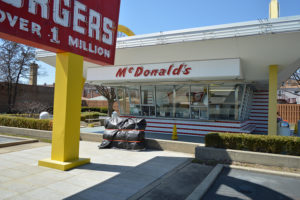
I’ve complained before about Russ Roberts’ Econ Talk failing to note the importance of economic rent and land costs. So I was pretty pleased to hear his guest Philip Auerswald say
I think the hero in all this, and I talk about this in The Code Economy, turns out to be Henry George. I mean, I think he really, you know, the 19th century U.S. economist–and he really anticipated these phenomena more clearly than anybody.
Pleased enough to read Auerswald’s new book. And he does get a lot of what George wrote about.
Auerswald’s main point seems to be that an economy doesn’t just have inputs and outputs, but what’s more important is the methods by which the inputs are used to produce the outputs. That’s “code,” and folks have been using it for 40,000 years. In recent centuries, standardization and automation of various kinds have increased productivity — the amount of stuff which a given amount of inputs could produce.
And, as we see computers and machine-driven processes increasingly capable of replacing human labor, what will humans do? He endorses Henry George’s analysis that, as productivity increases, rents will increase. And he supports the citizens’ dividend (tho he does not use the term), to be funded by a land value tax.
But his concluding pages seem to assume that, of course everyone will have a guaranteed income from land rent, no problem there, but what will people do with their time? To George, the problem was to get a fair distribution (not redistribution, because by right the rent belongs to everybody) of wealth, which he expected would result, over time, in social progress and a more constructive community. When I look at Wikipedia, Flickr, some blogs and a bunch of other internet resources, I tend to agree with George. Auerswald assumes the wealth distribution, but doesn’t assume that people and the community will improve. If I looked at Facebook or some other sites I might agree with him.
Auerswald also makes interesting use of the concept of comparative advantage, applying it to humans exchanging work with machines. Machines can do certain kinds of work millions of times faster than humans, so logically machines should do such work. In other tasks the difference might be much less, so those tasks would remain with humans (tho I would guess at much lower wages than currently.) And then there are some “low-volume, high-price” tasks which might remain human monopolies.
*****If you’re not the editor of Auerswald’s book, stop reading here*****
This book is full of irritating errors. On page 2 is a list of ingredients for chocolate chip cookies, comprising butter, sugar, water, salt, and chocolate chips — but no flour. Page 92 says “slavery was abolished in the British Empire in 1807,” while Wikipedia provides various dates, depending on your definition, in the 1830s or 1840s. Page 120 places Ray Kroc’s first McDonalds in “Desplaines, California.” Page 175 calls Zipcar a “ridesharing” platform, corrected on page 213 to “car-sharing.” “As Henry George understood nearly a century ago” on page 232 doesn’t seem likely regarding a man who died in 1897 mentioned in a 2017 book. There are probably more, that historians or various kinds of geeks would notice.